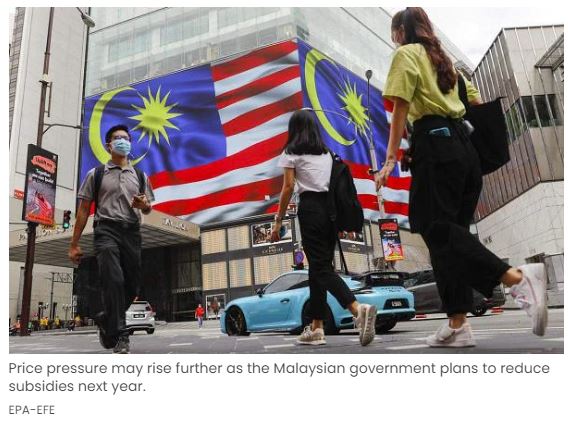Malaysia raises key policy rate to 2.75% in fourth hike this year
MALAYSIA’s central bank raised its overnight policy rate (OPR) by 25 basis points to 2.75 per cent on Thursday (Nov 3) in its fourth hike this year – a move that was expected by economists – to “pre-emptively manage the risk of excessive demand on price pressures”, said Bank Negara in its statement.
The decision was made against “the backdrop of continued positive growth prospects for the Malaysian economy”, said Bank Negara. It added that the monetary policy committee is “not on any pre-set course, which means that monetary policy decisions will continue to depend on evolving conditions and their implications on the overall outlook to domestic inflation and growth”.
The decision came a day after the United States Federal Reserve increased its key interest rate by 75 basis points to 4 per cent, and hinted at further rate cuts until inflation is tamed.
Bank Negara’s latest hike had been anticipated by 22 out of 24 economists in a Bloomberg poll, with the rest expecting the rate to remain unchanged. With this move, Bank Negara has delivered a cumulative 100 basis points in rate hikes this year, pushing the OPR back up to its pre-pandemic level of 2.75 per cent.
Given the country’s strong economic growth and simmering inflation, Standard Chartered Global Research’s chief economist for Asean and South Asia Edward Lee and economist Jonathan Koh said that Bank Negara has not sent a clear signal that it will stop after the November hike.
“At the current OPR level, the stance of monetary policy remains accommodative and supportive of economic growth. Any adjustments to the monetary policy settings going forward would continue to be done in a measured and gradual manner,” said the central bank, adding that the next monetary policy meeting will be in mid-January.
Malaysia’s inflation edged down to 4.5 per cent in September, lower than August’s 4.7 per cent as food price increases slowed down. The core inflation rate, however, increased to 4 per cent in September, from 3.8 per cent in August.
Though household spending should stay strong and tourist arrivals have risen, external demand is expected to moderate following softening global growth, said the central bank. But it added: “Despite bouts of heightened volatility in the global financial and foreign exchange markets, these developments are not expected to derail Malaysia’s growth.”
Bank Negara said that headline inflation is likely to have peaked in the third quarter of this year, and is expected to moderate thereafter. It maintained its forecast for core inflation to average closer to the upper end of the 2 per cent to 3 per cent range this year. Core inflation has averaged 2.7 per cent year-to-date.
But economists observed that the country will continue facing price pressures as the government plans to reduce subsidies next year. In a report on Nov 2, RHB Bank economists Chin Yee Sian and Wong Xian Yong noted that with potential adjustments to fuel and food subsidies, the peaking of inflation could be delayed until some time in 2023. They expect the OPR to rise to between 3 per cent and 3.5 per cent by the first half of next year.
The central bank will announce third quarter gross domestic product (GDP) figures on Nov 11. Earlier, Malaysia’s Finance Ministry revised its 2022 GDP growth target downwards to a range of 6.5 per cent to 7 per cent, from the previous projection of 5.3 per cent to 6.3 per cent. It expects growth to ease to between 4 per cent and 5 per cent next year, anticipating a global slowdown.
The monetary policy committee’s next meeting is scheduled for Jan 18 and 19 next year.
Source: https://www.businesstimes.com.sg/asean-business/malaysia-raises-key-policy-rate-to-275-in-fourth-hike-this-year


 Thailand
Thailand




